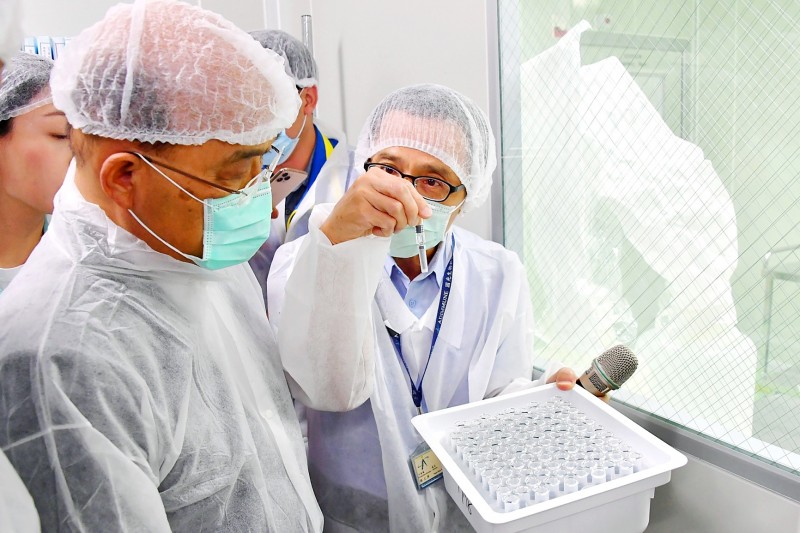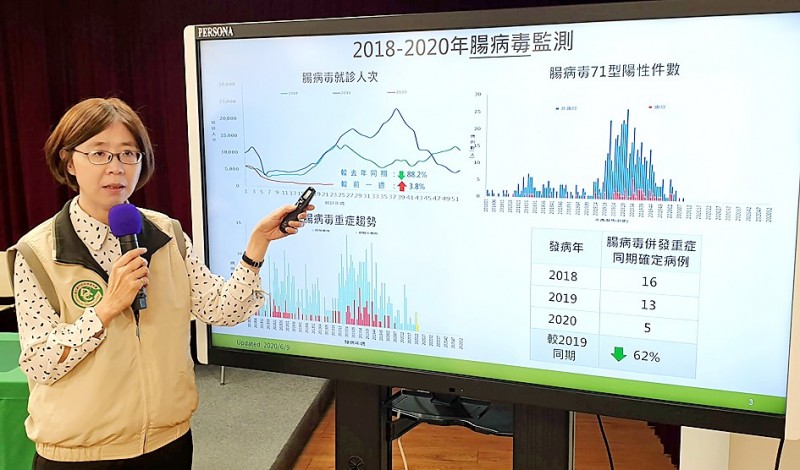《TAIPEI TIMES》 Infectious diseases incidence falls: CDC

Premier Su Tseng-chang, left, listens to an Adimmune Corp employee during a visit to the company’s plant in Taichung yesterday. Photo: CNA
KEEPING CLEAN: The sharp drop is likely due to people following disease prevention measures such as frequent handwashing, wearing masks and social distancing
By Lee I-chia / Staff reporter
The Centers for Disease Control (CDC) yesterday reported a significant drop in the case numbers of several types of infectious diseases in the first half of the year, attributing it in part to more people wearing masks and practicing personal protective measures to prevent COVID-19 infection.
The number of cases of flu-like illness and enterovirus infection reported from May 31 to Saturday last week fell 71.1 percent and 88.2 percent respectively from the same week last year, CDC Epidemic Intelligence Center Director Liu Ting-ping (劉定萍) said.
Taiwan regularly enters the peak season of enterovirus infections in May or June, with weekly reported cases exceeding the epidemic threshold (11,000 hospital visits in a week) in week 22 last year, while there were only 1,360 hospital visits last week (week 23), she said.
The number of cases of respiratory infectious diseases also declined significantly, with zero cases of measles or rubella reported so far this year, compared with 100 cases of measles and 17 cases of rubella in the same period last year, Liu said.
The case numbers of invasive pneumococcal disease and pertussis (whooping cough) also dropped 39 percent and 81 percent respectively, she added.
The sharp declines are likely attributable to more people wearing masks and washing their hands frequently, practicing social distancing and other personal protective measures to avoid contracting COVID-19, she said.
As for insect-borne diseases, Liu said there were no reports of Japanese encephalitis or domestic dengue fever so far this year, while the case numbers of scrub typhus and imported dengue fever dropped 43 percent and 67 percent respectively from the same period last year.
The reduced numbers might be due to fewer people traveling abroad or taking part in outdoor events, as most local dengue fever outbreaks in Taiwan begin with imported cases, she said.
However, there have been five cases of hantavirus hemorrhagic fever this year, CDC physician Lin Yung-ching (林詠青) said.
As the disease is transmitted to humans by inhaling the particles in the urine, saliva, or droppings of infected rats, mice and other rodents, people should wear a mask and rubber gloves when cleaning spaces and objects contaminated by rodents, and use bleach to disinfect the area, he said.
CDC Deputy Director-General Chuang Jen-hsiang (莊人祥) said that the five cases mark a 20-year high, adding that hantavirus hemorrhagic fever occurs sporadically in Taiwan, and people can avoid contracting it by practicing rodent control and keeping their environment disinfected.
Separately, Chuang said there were no new cases of COVID-19 infections yesterday, and only five infected patients remain isolated in hospitals.
The Central Epidemic Command Center (CECC) on Monday said it is planning to ease regulations to make it easier for business travelers to visit Taiwan after border restrictions are relaxed, such as having all foreign visitors take a polymerase chain reaction (PCR) test upon arrival.
The center is also considering allowing business travelers to enter Taiwan if they have obtained a negative PCR test result from their point of departure, giving them a shortened home quarantine period of five to 10 days, requiring them to take another self-paid PCR test before being released from quarantine and performing self-help management for 21 days from the date of arrival, said Chuang, who is also a CECC spokesman.
The CECC is considering first easing restrictions for business travelers from countries with a lower risk of COVID-19, such as New Zealand, Australia, Vietnam and Brunei, but more negotiations are needed, he said.
新聞來源:TAIPEI TIMES

Epidemic Intelligence Center Director Liu Ting-ping gives an update on the COVID-19 pandemic situation at the Central Epidemic Control Center’s daily news conference in Taipei yesterday. Photo: CNA




















